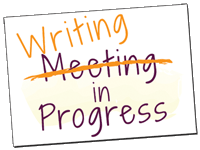 In the intro to A Meeting With Your Writing I ask participants to list everything that comes to mind when they ask this question:
In the intro to A Meeting With Your Writing I ask participants to list everything that comes to mind when they ask this question:
“What does this writing project need to move forward?”
I give them 30 – 60 seconds to write. Then I ask them to select the thing on that list that they most want to do (for whatever reason; that isn’t always the most fun thing). I remind them that even if there is a gremlin saying that this “isn’t really writing”, it will move their writing project closer to finished so it counts.
What if reading is on your list of what your writing project needs?
On the one hand, if the thing you need to do to move this project forward is read something, then reading counts. On the other hand, you might have a gremlin who thinks you need to do more reading before you can write.
How do you tell if reading is really what you need to do?
 The best way to tell if it’s a gremlin is if it’s trying to prevent you from writing anything at all before you’ve done more reading. Gremlins have some kind of irrational fear of shitty first drafts. They don’t want you to have to revise. Ever. Except maybe some spelling mistakes and typos.
The best way to tell if it’s a gremlin is if it’s trying to prevent you from writing anything at all before you’ve done more reading. Gremlins have some kind of irrational fear of shitty first drafts. They don’t want you to have to revise. Ever. Except maybe some spelling mistakes and typos.
That’s not how writing works. Writing is rewriting. Rewriting is writing. Shitty first drafts are an essential part of the process.
Write early. Write often.
Write what you know now. Make notes you know are incomplete or possibly erroneous or whatever. Makes notes to check things. But write. Lots of words. Crappy words you can rewrite later.
Then read to fix one of those spots that you aren’t sure about. Read enough to fix it. Then write the new version.
Then find another spot that needs fixing. Read enough to fix it. Write the new version.
Rinse. Repeat.
YOU need to drive the narrative
The gremlin is worried you don’t have anything to say. It thinks that other people have more important things to say and if you just read enough of them you’ll be okay. It’s like that teacher who told you she didn’t want to hear your opinion. If that was ever a reasonable thing to say, you are long past that now.
The whole point of writing this is to express your opinion. It will be your educated opinion, based on the research you’ve done and the literature in your field. But it will be yours.
If reading helps you make a stronger argument, read. If reading is a way of calming your fear that what you have to say isn’t worth saying, write.
Related posts:
Beware the couch! Reflections on academic reading by Dr Robyn Mayes at The Thesis Whisperer gives a good overview of academic reading with links to a whole series of videos she’s made on different aspects.
Related posts added 31 May 2019.









Excellent blog post about a common persistent gremlin.
One thing I have found useful is the “TK” marker used as a placeholder. Stuff you might need to read up on or look up but should be done separately from a good writing session.
I haven’t gotten into the habit of using it but it was very helpful in the few times I remembered to make use of it!
Perhaps you discuss a technique similar to this in your other blog posts?